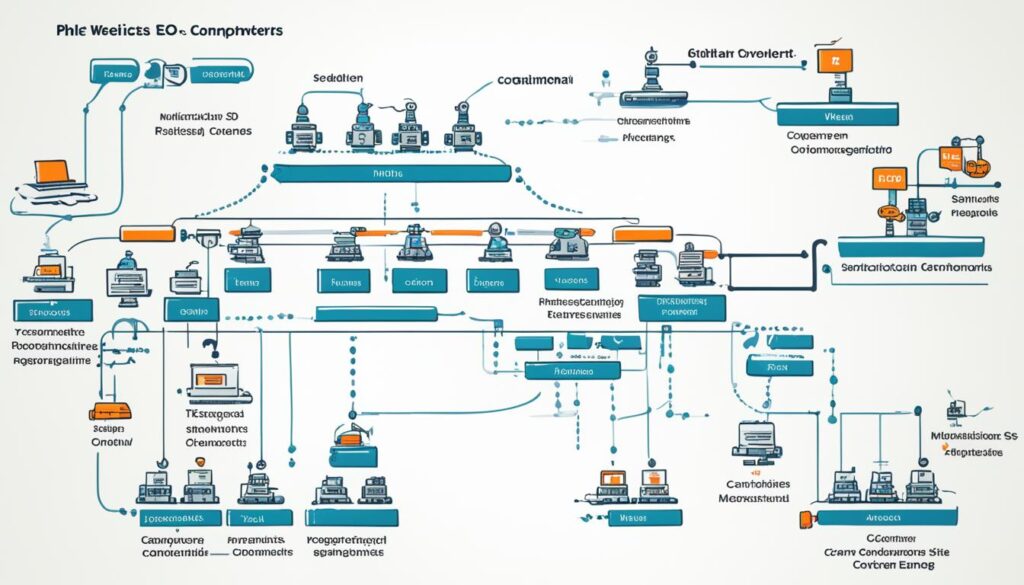In our digital age, improving Google rankings is key for site owners. It’s a mix of art and science. This SEO guide shows how to be seen on Google, made for beginners.
Following SEO basics does more than just make your site look good. It makes sure Google’s algorithms notice your content. As the online world changes, so does SEO. It becomes part of how Google ranks sites. Learning SEO takes time, but it starts with checking if Google has seen your site using the site: search.
SEO connects what you write to those who are looking for it. Making changes and analyzing your site can make it stand out to search engines. If you’re unsure or stuck, getting professional help can make a big difference. Check out strategic adjustments and keen analysis for tips.
Key Takeaways
- Understanding SEO is important for better visibility on Google.
- Check if your site is indexed by Google to start optimizing.
- Implementing SEO well can take some time but is worth it.
- Google’s tools, like the URL Inspection Tool, show how it views your page.
- Getting advice from SEO pros can help solve technical issues.
Understanding SEO and How it Affects Your Google Rankings
Search Engine Optimization, or SEO, is key for making your content easy to find online. It boosts your site’s visibility in search results. This affects how well Google can find and rank your site. Every day, billions of searches happen. Knowing how Google Search works can greatly improve your site’s place on the web.
Google uses smart algorithms and crawlers to find and index new pages. These crawlers usually find your site through links from other sites. This means your site’s SEO can get better without you doing anything directly. To make your site stand out, make sure it’s easy for crawlers to read and rank it high.
Now, let’s talk about what makes your content more visible and high-ranking:
- Site Structure: A well-organized site with a clear structure is easy for both users and crawlers to navigate. Good organization also makes for a better user experience, a key factor in SEO rankings.
- Canonical URLs: Using canonical URLs can prevent duplicate content issues. It tells search engines which pages to focus on. This saves crawling resources.
- User Experience (UX): A mobile-friendly site, easy navigation, and fast loading times all boost SEO. Google ranks sites higher if they offer a good user experience. Improving how users interact with your site also helps SEO performance.
| SEO Factor | Description | Impact on Google Search |
|---|---|---|
| Logical site structure | Helps users and search engines navigate the content. | Improves index and search visibility. |
| Canonical URLs | Addresses duplicate content issues. | Focuses crawling resources on preferred content. |
| User Experience | Includes responsive design, fast load times, and clear navigation. | Directly influences user engagement and retention. |
Using these strategies improves your SEO and makes your content easier to find on Google. The main aim is to make your site attractive to users and understandable to Google’s algorithms.
Conducting Effective Keyword Research
Mastering keyword research is key for boosting online presence. By focusing on identifying keywords that users search for, companies can create targeted content. This enhances SEO rankings.
Finding the Right Keywords for Your Website
The first step in SEO strategy is choosing the right target keywords. Your business goals and niche influence this choice. Google Keyword Planner is a free tool that helps find keywords perfect for PPC campaigns. It also shows search volume and competition.
Tools and Techniques to Identify Potential Keywords
Semrush’s Keyword Magic Tool offers more than just search volumes with its 25.7 billion keywords. It provides trends, difficulty levels, and insights on competitors through the Keyword Gap analysis. This feature helps businesses see what keywords they’re missing out on.

Understanding Search Intent for Keyword Strategy
It’s crucial to match content with what users intend to find. Users might want information, to buy something, or to visit a specific site. There are different intents like navigational, informational, commercial, and transactional. Each demands specially tailored content.
Tools like Semrush’s Keyword Overview examine the intent behind searches. This helps marketers create content that meets user expectations. It also boosts SEO performance.
Applying these keyword research methods helps businesses grow online. They connect better with their audience, see better performance metrics, and achieve marketing goals.
Optimizing Website Structure for Better Crawlability
A site’s organization and technical SEO can greatly improve crawlability and content accessibility. This boosts SEO performance. By enhancing website structure, we meet search engines’ needs and offer a better experience for users. This improvement indirectly raises your site’s rankings.
Creating a clear website structure is key in technical SEO. A well-organized site helps search engines index your pages better. When pages are logically laid out and linked, navigation becomes smoother. This makes it easier for users and search engines to find content.

Key statistics show the value of smart site structure and technical tweaks:
| Optimization Technique | Impact on Site Performance | Percentage Increase |
|---|---|---|
| Web Performance Optimization | Conversion Rate Increase | 7% |
| Lazy Loading Implementation | Reduction in Initial Page Load Time | 50-75% |
| Quality Backlinks | Increase in Organic Traffic | 30% |
| Canonical Tags | Reduction in Duplicate Content Issues | 20% |
| Structured Data (Schema Markup) | Increase in Click-Through Rates | 20-40% |
| Technical SEO Continuous Workflow | Improvement in Site Performance | Ongoing |
Stats show that using schema markup, boosting web performance, and implementing lazy loading helps a lot. They’re not just fixes but key strategies to make your website more discoverable and efficient.
Linking structured data with your site’s architecture boosts your content’s presence in search results. This drives more traffic and conversions. Making sure your site is easy to navigate and its content is accessible is key. It helps you make the most of technical SEO for users and search engines.
Mastering On-Page Optimization Practices
Digital creators and marketers know that on-page optimization is key to their success. This process includes using SEO-friendly URLs, improving meta tags, and strategizing with header tags. These steps boost a website’s visibility. Search engines then better understand and rank the site’s content.
Creating Search Engine Friendly URLs
SEO-friendly URLs do more than follow a technical rule. They make content clear and relevant. Keeping URLs short, under 50 characters, and including important keywords helps guide visitors from search results to your site. For tips on making these URLs, check out Mike Paim’s digital strategies.
Improving Meta Tags and Descriptions
Working on meta tags and descriptions is like polishing a book’s cover. It makes people want to see what’s inside. Trying different title tags to see which ones increase clicks and rankings is helpful. Search engines prefer websites that update their content often. This tells users the site’s information is current. Using tools like Google Analytics and Search Console helps track how well these changes perform.
Utilizing Header Tags Effectively
Using header tags is not just about formatting. It’s both an art and a technique that boosts readability and SEO. Including clear headings and subheadings helps organize content. This makes it easier to read and highlights keywords for search engines. Good internal linking also spreads link equity and improves user experience. For more in-depth advice, visit the on-page optimization guide by Foundation Inc.
FAQ
How does search engine optimization work to improve Google rankings?
What impact does SEO have on my website’s positioning in Google’s search index?
How do I find the right keywords for my website?
What tools and techniques are used to identify potential keywords?
Why is understanding search intent important in keyword strategy?
How does site organization affect my website’s crawlability by search engines?
What on-page optimization practices can I master to further improve SEO?
How do creating search engine friendly URLs benefit my website?
In what ways can I improve my meta tags and descriptions?
How should I utilize header tags effectively for SEO?
Source Links
- How to Rank Higher On Google (13 Steps) – https://backlinko.com/rank-high-on-google
- Five Ways to Improve Your Site’s Ranking (SEO) | Michigan Tech – https://www.mtu.edu/umc/services/websites/seo/
- How to improve your local ranking on Google – https://support.google.com/business/answer/7091?hl=en
- SEO Starter Guide: The Basics | Google Search Central | Documentation | Google for Developers – https://developers.google.com/search/docs/fundamentals/seo-starter-guide
- Understanding Google Ranking Factors for SEO – https://www.abstraktmg.com/google-ranking-factors-for-seo/
- Keyword Research for SEO: What It Is & How to Do It – https://www.semrush.com/blog/keyword-research/
- How to Do Keyword Research for SEO: A Beginner’s Guide – https://blog.hubspot.com/marketing/how-to-do-keyword-research-ht
- WPDS Documentation & Resources – https://build.washingtonpost.com/resources/guides/performance-and-seo
- The Complete Guide to Technical SEO Optimization – https://www.conductor.com/academy/technical-seo-optimization/
- The Power of Website Structure: How to Optimize for SEO – https://www.strikingly.com/blog/posts/power-website-structure-optimize-seo
- Mastering On-Page Optimization: Improve Your Page Rankings – https://www.shoutdigital.com.au/mastering-on-page-optimization/
- Mastering On-Page SEO: Tips and Techniques for Higher Rankings – https://www.linkedin.com/pulse/mastering-on-page-seo-tips-techniques-higher-rankings-mahbub-magfar


